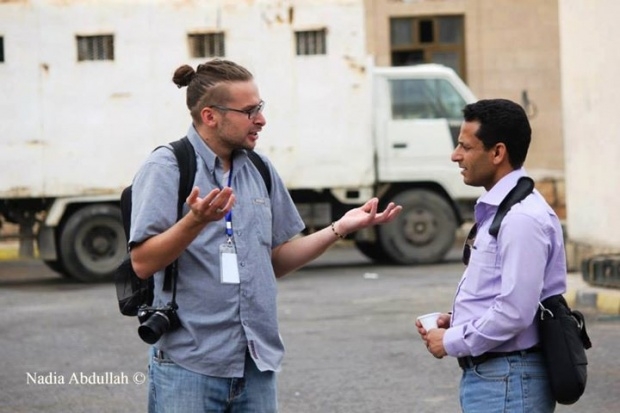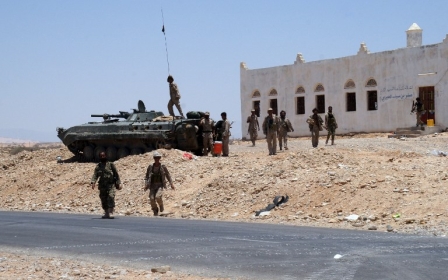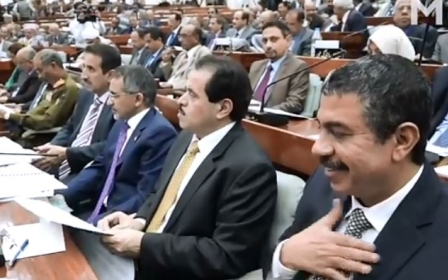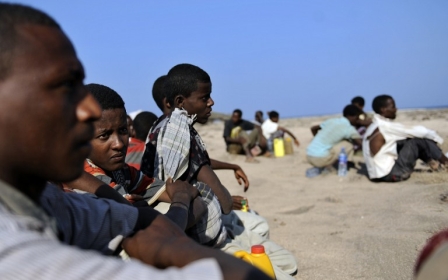Yemenis remember slain photojournalist Luke Somers

Yemeni friends of Luke Somers, the American photojournalist who was executed by al-Qaeda during a US-led military operation in South Yemen on Saturday, have expressed their sorrow at his killing and called on their government to confront rising incidents of kidnapping in the country.
Seized from a busy street in the capital Sana’a by al-Qaeda in September 2013, Luke Somers was killed alongside a South African teacher, Pierre Korkie when US Special Forces launched a failed rescue bid in a village in Yemen’s southern province of Shabwa.
Months before his abduction, Luke worked as a copy editor and photographer for the National Dialogue Conference (NDC) - transitional talks aimed at establishing a roadmap for Yemen’s future.
“Luke’s job was examining the quality of English stories that we write about the conference’s events. Then we hired him as a photographer, since we were in need of a professional photographer,” said Haitham al-Kibsi, Luke’s friend and boss during his work for the NDC.
Luke’s ordeal hit the headlines on 4 December, when al-Qaeda militants released a video threatening to execute him if the US government did not meet a three-day deadline to accept their undisclosed demands.
Like many of Luke’s friends, Kibsi waited fearfully as the deadline for the ultimatum loomed.
“I expected to hear about his fate on the TV,” said Kibsi.
Instead, a foreign journalist who learnt early about Luke’s murder contacted Kibsi to offer condolences and interview him about his days with Luke.
“I was shocked,” Kibsi said.
Kibsi said that during the NDC, he and other colleagues, including Luke, used to work for at least 18 hours on some days.
“Luke was a workaholic and a superb photographer,” he said.
Another good quality that endeared Luke to his friends, Kibsi said, was his regard for religious rituals, especially during the holy month of Ramadan when Muslims fast from dawn to sunset.
“Luke was a heavy smoker but he neither ate nor smoked in front of us during work in Ramadan.”
Energetic photographer
Zaid al-Alaya'a, the former editor-in-chief of the Yemen Observer newspaper, first met Luke in Sana’a in 2011.
“Luke was a very nice and outspoken person. He demonstrated a great and rare respect for Yemenis and Yemeni culture,” said Alaya’a.
In 2011 a nationwide uprising broke out in the Yemeni streets against the government of former president, Ali Abdullah Saleh.
Saleh’s opponents made Sana’a’s Satteen Street a springboard for their massive weekly rallies. On the other side, Saleh loyalists used to gather in Sabeen Street near his palace to show their support and solidarity with their leader.
As a passionate photographer, Alaya'a remembered, Luke crisscrossed the capital, taking photos of the rival gatherings in the Yemeni capital.
“During the 2011 uprising, you would see Luke in the Friday sermons on Sabeen, and the next Friday he would be in Satteen, taking pictures and documenting the most important moment in the modern history of Yemen,” recalled Alaya'a who currently works as a senior public information assistant at the UNHCR.
Luke’s appearance in the al-Qaeda video last week prompted many Yemenis, including those who oppose the Sana’a government, to appeal for al-Qaeda to set him free.
Abdul Razzaq al-Jamal, a Yemeni journalist who interviewed Naser Bin Ali al-Ansi, al-Qaeda’s leader who appeared in the 4 December released video, said that Luke and other Americans who disagree with the US government in regard to American drone missions in Yemen should not bear the brunt of their government’s faulty policies.
“The kidnapped American journalist with al-Qaeda in Yemen did not agree with his country’s foreign policies. He was among many Americans who have a role in exposing the crimes of US foreign policies, like extrajudicial killings,” he said on his Facebook page a day before Luke’s killing.
Condemnation
The Yemeni Journalists’ Syndicate, an umbrella organisation for hundreds of journalists, condemned the killing of the US photojournalist, calling on the security apparatus to ensure the safety of foreign journalists who live in Yemen.
YJS Secretary-General Marwan Dammaj told Middle East Eye that he and other journalists feel “ashamed” that they did not save Luke’s life.
“His death is a big loss to Yemen's journalism family. We would like to offer our deep condolences to his family. We condemn the kidnapping of any person in general and journalists in particular,” Dammaj said.
Luke’s death has also renewed debate about the practice of kidnapping, which has greatly ravaged tourism in Yemen.
Over the past several years many rebellious tribal leaders have resorted to kidnappings aimed at gaining leverage in settling disputes with the government. Abduction has also been used to win high ransom payments or win the release of jailed relatives in the capital.
But tribal leaders have recently begun to sell hostages on to al-Qaeda militants.
YJS Secretary-General Dammaj warned that tribal leaders will continue snatching foreigners from Yemen’s streets if the country’s weakening security apparatus does not improve its performance.
New MEE newsletter: Jerusalem Dispatch
Sign up to get the latest insights and analysis on Israel-Palestine, alongside Turkey Unpacked and other MEE newsletters
Middle East Eye delivers independent and unrivalled coverage and analysis of the Middle East, North Africa and beyond. To learn more about republishing this content and the associated fees, please fill out this form. More about MEE can be found here.




